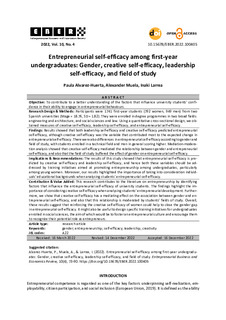Izenburua
Entrepreneurial self-efficacy among first-year undergraduates: Gender, creative self-efficacy, leadership self-efficacy, and field of studyEgilea (beste erakunde batekoa)
Argitalpen data
2022-12-30Ikerketa taldea
Berrikuntza eta esku-hartzea hezkuntza inklusiboanHezkuntza prozesuak
STEM eta digitalizazioa
Beste erakundeak
Universidad del País Vasco/Euskal Herriko Unibertsitatea (UPV/EHU)Bertsioa
Bertsio argitaratuaDokumentu-mota
ArtikuluaArtikuluaHizkuntza
IngelesaEskubideak
© The authorsSarbidea
Sarbide irekiaArgitaratzailearen bertsioa
https://doi.org/10.15678/EBER.2022.100405Non argitaratua
Entrepreneurial Business and Economics Review Vol. 10, nº 40, pp. 73-89Argitaratzailea
Cracow University of EconomicsGako-hitzak
Gender
Entrepreneurship
Self-efficacy
Leadership ... [+]
Entrepreneurship
Self-efficacy
Leadership ... [+]
Gender
Entrepreneurship
Self-efficacy
Leadership
Creativity [-]
Entrepreneurship
Self-efficacy
Leadership
Creativity [-]
Laburpena
Objective: To contribute to a better understanding of the factors that influence university students’ confidence in their ability to engage in entrepreneurial behaviours.
Research Design & Methods: ... [+]
Objective: To contribute to a better understanding of the factors that influence university students’ confidence in their ability to engage in entrepreneurial behaviours.
Research Design & Methods: Participants were 1741 first-year students (792 women, 949 men) from two Spanish universities (Mage = 18.76, SD = 1.82). They were enrolled in degree programmes in two broad fields: engineering and architecture, and social sciences and law. Using a quantitative cross-sectional design, we obtained measures of creative self-efficacy, leadership self-efficacy, and entrepreneurial self-efficacy.
Findings: Results showed that both leadership self-efficacy and creative self-efficacy predicted entrepreneurial self-efficacy, although creative self-efficacy was the variable that contributed most to the expected change in entrepreneurial self-efficacy. There were also differences in entrepreneurial self-efficacy according to gender and field of study, with students enrolled in a technical field and men in general scoring higher. Mediation-moderation analysis showed that creative self-efficacy mediated the relationship between gender and entrepreneurial self-efficacy, and also that the field of study buffered the effect of gender on entrepreneurial self-efficacy.
Implications & Recommendations: The results of this study showed that entrepreneurial self-efficacy is predicted by creative self-efficacy and leadership self-efficacy, and hence both these variables should be addressed by training initiatives aimed at promoting entrepreneurship among undergraduates, particularly among young women. Moreover, our results highlighted the importance of taking into consideration individuals’ educational backgrounds when analysing students’ entrepreneurial self-efficacy.
Contribution & Value Added: This research contributes to the literature on entrepreneurship by identifying factors that influence the entrepreneurial self-efficacy of university students. The findings highlight the importance of considering creative self-efficacy when analysing students’ entrepreneurial development. Furthermore, we show that creative self-efficacy has a mediating effect on the association between gender and entrepreneurial self-efficacy, and also that this relationship is moderated by students’ fields of study. Overall, these results suggest that reinforcing the creative self-efficacy of women could help to close the gender gap in entrepreneurial self-efficacy. It might also be useful to design specific training initiatives for undergraduates enrolled in social sciences, the aim of which would be to foster an entrepreneurial culture and encourage them to recognize their potential role as entrepreneurs. [-]
Sponsorship
Gipuzkoako Foru AldundiaBildumak
- Artikuluak - Hezkuntza [135]
Item honek honako baimen-fitxategi hauek dauzka asoziatuta:






















